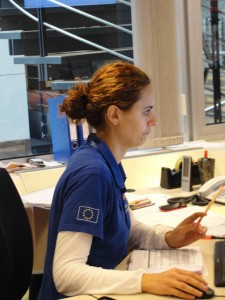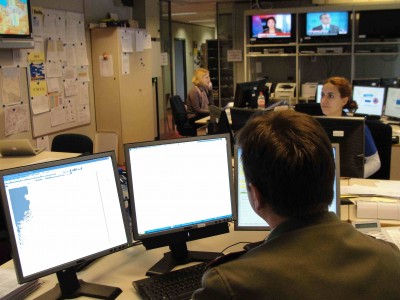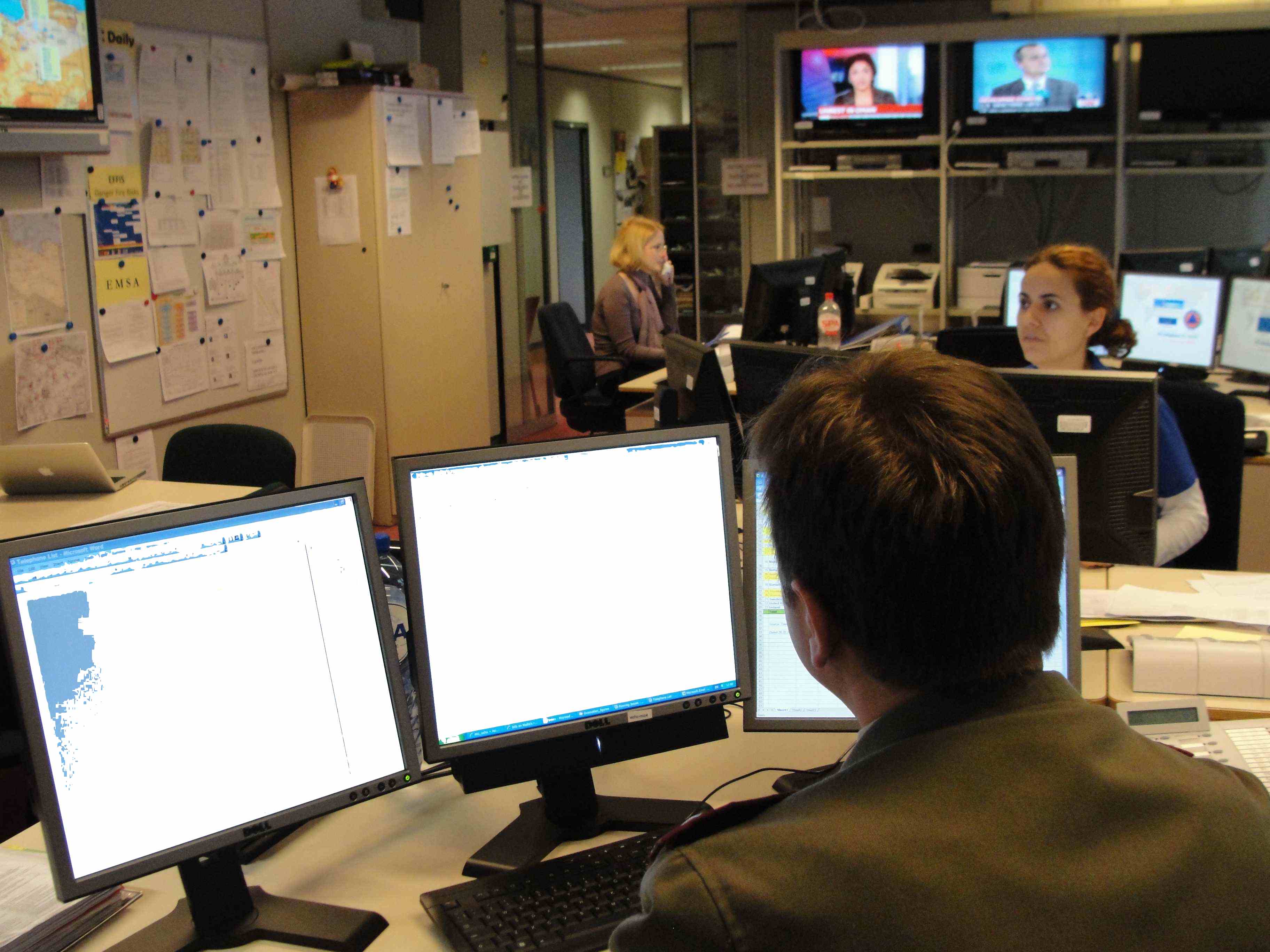The EU's “Evacuations” crisis unit, on the bridge

(REPORTAGE) In one of the buildings of the European Commission, after the Delta bridge, the light is permanently on, at 2e floor: to the “evacuation” crisis unit, including at weekends. The Crisis Information and Monitoring Mechanism (MIC) was indeed activated by the Hungarian EU Presidency and the EU High Representative for Foreign Affairs a week ago (on February 23).
On the bridge, that day when I visit them (it was Sunday), four people are on duty: two Commission agents (including an administrator), an agent seconded by the Hungarian Presidency for the crisis and a soldier from the 'EU General Staff. This is quite symptomatic of the role of this structure, which brings together the necessary skills even if they are not strictly those of the DG concerned (ECHO). Several screens on the wall, television to follow the news, monitoring for the main information in progress: map with Europeans in evacuation, list of people on duty, main contacts in the Member States, telephones and computers. Everything goes through there.
Coordinate the European effort
The objective of the crisis unit is, in fact, to facilitate coordination and the exchange of information between the European authorities for the evacuation of Europeans from Libya. It is the MIC which serves as a support for the operation. This is not the “primary” task of the cell, which rather has the function of coordinating aid in the event of a natural or technological disaster. But this is not the first time she has been called for evacuations. " The first time - remembers Peter Billing his deputy director – it was in 2006, at the request of Cyprus for the evacuation of citizens from Lebanon. The second, after the attacks in Mumbai. A Swedish plane made it possible to evacuate seriously wounded, British and Spanish, with European co-financing. »

European co-funding available
The advantage of the European system is twofold: to allow the exchange of information in real time on the means available. The presence of a soldier within the MIC, in charge of "theAir Movement planning", makes it possible to maintain the link with the military support resources committed on the spot by a dozen European States. But it is also of a financial nature.
The European budget makes it possible, in fact, to cover 50% of the cost of the planes sent to the country for the countries which request it. According to our information, two countries have requested it: Hungary and Bulgaria, which have thus been able to dispatch a plane to Tripoli, at lower cost. This is not negligible for countries that do not have great financing possibilities.
COol, the secure EU consular tool
The work of the MIC is part of a more general crisis structure, set up at the level of the European diplomatic service (EEAS). This mechanism comprises two levels: the political level, with a conference of all the European officials concerned (EEAS, DG Echo, DG Home Affairs, etc.) generally at a high level (director general or deputy). It is " go around all the subjects: political, economic, migratory aspects ».
This meeting is supplemented by a teleconference, daily (or almost), with all the consular services of the 27, meeting facilitated by the SitCen (the situation center of the EU). Precious moment when everyone exchanges their information, in particular the list of people who want to be evacuated. The names are then transmitted by the consular site of the European Union (the COol website as Consular On Line). It is also through this secure network that all information passes, except for teleconference meetings.
The principle of support Collective
Solidarity played out. Almost all European planes have taken on board citizens of other EU countries. " It's really the development of the last few years, a plane sent by a State is no longer reserved for nationals only but can take all European Union nationals who want it », or even those of other countries who request it. Ukraine, for example, has requested European assistance.
The difficulty for evacuation, isolated people
The actual citizen evacuation phase ends. Friday (February 25), 1600 people were evacuated, Monday, there were less than 700 people left to evacuate. And 650 (often dual nationals) who did not want to be evacuated. " If the number of people to evacuate decreases, it is not automatically easier ” estimates the specialists of the question. " We have isolated people, who must be grouped together, then taken to a place where they can then be evacuated. All in hazardous security conditions. The journey to the airport can be risky. He also manages to reach people so that they are at the given place, at the time T ".

Evacuation phase almost complete, new mission in sight
Now begins the actual humanitarian phase. And the MIC could be mobilized again, this time in the other direction. Two main problems arise.
First of all, assistance to displaced persons at the borders of Libya, in Egypt but, above all, in Tunisia. This is where the situation is"more critical", recognized Pierre Vimont, the secretary general of the diplomatic service, Tuesday, before the European Parliament. "There is a lack of resources and equipment". Provisional reception structures, such as refugee camps, must be put in place. But there are also people who will have to be repatriated to their country. For several thousand African workers, in particular, who have not means of evacuation, the situation is particularly critical.Two agents from ECHO – the Humanitarian Office for Humanitarian Aid are already on the spot – on an assessment mission, one in Egypt, the other in Tunisia.
Then there are the needs inside Libya itself, especially in the "liberated" areas, in Benghazi or elsewhere. Where it is not always easy for commercial airliners to land. The exact needs are yet to be assessed. The problem is to identify the needs and especially to have interlocutors. Several European diplomats have been tasked with identifying these interlocutors and establishing contacts. On the humanitarian side, as the spokesperson for the Commissioner responsible for humanitarian aid confirmed to the press on Tuesday: we are looking to enter Libya to assess internal needs. We studied assistance by private armed guard companies. But we don't want that. We are currently looking for the ad hoc structure with which to enter”.
Read also:

